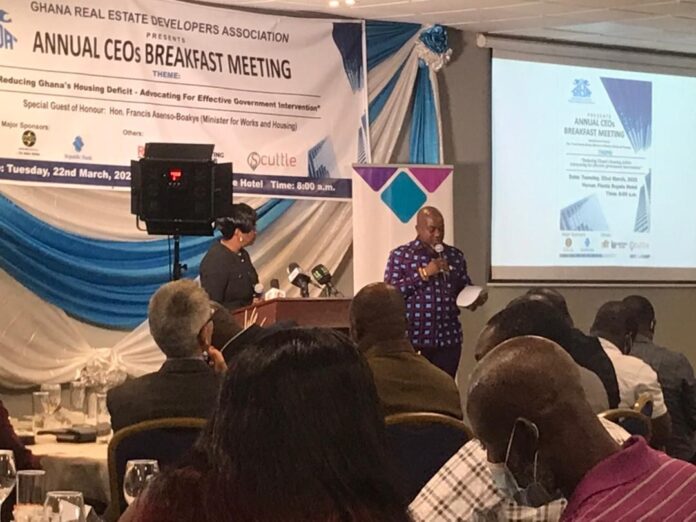
Real estate developers in the country have proposed an 11 percent interest rate on dollar-denominated mortgages while the cedi counterpart attracts a 14 percent interest rate to help provide affordable housing to Ghanaians through the Real Estate Investment Fund.
This, they contend, will help meet government’s proposal to cut down current prices of proposed affordable housing projects by about 50 percent to 25,000 dollars.
The Real Estate Investment Fund, which is yet to start operation, is aimed at providing cheaper sources of funding for local real estate developers to complement government’s drive to bridge the country’s housing deficit of 1.7 million units.
“The discussion is still ongoing, and we think that members of the Ghana Real Estate Developers Association (GREDA) can help government meet the housing demand. However, we must first look at the prevailing interest rate in the country, which is not conducive for developers,” re-elected President of the GREDA, Patrick Ebo Bonful, told the B&FT in an interview after a swearing-in ceremony in Accra.
Mr. Bonful stressed that even though the association is yet to complete talks with government, the Minister for Works and Housing has shown immense commitment in getting realistic affordable housing for Ghanaians through public-private partnership.
He maintained that it is imperative for government to meet some recommendations from the association, since private developers cannot go to the financial market and borrow at the current interest rate – a rate he described as “unworkable”.
“We would like to see another GREDA estate constructed during the term of these Executive Council members. We will continue our effort to conclude reviewing the commercial contract with the Ministry of Works and Housing for developing 20,000 Affordable Housing Units across the country,” he assured.
Attributing the high cost of housing in Ghana to raw materials, Mr. Bonful lamented that the real estate business has faced a lot of challenges due to the unstable prices of building inputs.
“The rising cost of cement, iron rods and other building materials poses the greatest challenge to our affordable housing delivery yet,” he said, proposing cheaper ways for modern building – such as the use of mud.
“I am challenging all of us to come out with sustainable solutions to counter this problem. I urge all of us to take a second look at our building construction methodologies and materials use to advise government on policy directions needed to address the canker,” he said.
He urged stakeholders in the construction sector to consider new methods, such as interlocking hydrologically compressed bricks in addition to several other building systems that can help out.
Presenting some more proposals, Mr. Bonful asked for a review of the Home Mortgage Finance Act 2008 (Act 770) to align with the current financial status of ordinary workers.
He added that there must be a re-look at the registration of lands for Allodial owners of land, as well as proper digitalisation of the land registration process.
Re-echoing sentiments of the association’s members, he called for tax-breaks for developers to make affordable housing delivery a reality.









